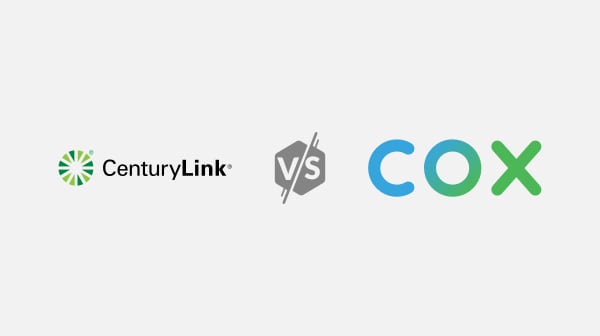COX vs CenturyLink Internet for Business Review

For these two internet service providers, we sifted through pricing, speed and data, and customer service information (ISPs). Let's take a closer look at Cox vs. CenturyLink to see which is better for you. Cox is your best choice for your business if you want fast internet speeds. When you're on a tight budget, you might want to take advantage of CenturyLink's Price for Life guarantee on its DSL internet plans.
Cox
Pros
Some low-cost plans
Lots of speeds to choose from
No contract on most plans
Cons
Costly high-end plans
Poor customer service
CenturyLink
Pros
Price for Life guarantee
No contracts
Fiber option for some cities
Cons
Confusing download speeds
Poor speed performance
Not-so-great customer service
Cox vs CenturyLink: Prices and Plans
Provider: Cox Internet
Monthly price: $29.99–$99.99*
Download speeds: 10–940 Mbps
Data cap: 1–1.25 TB
Provider: CenturyLink Internet
Monthly price: $49–$65†
Download speeds: 15–940 Mbps
Data cap: 1 TB–Unlimited
When prices and speeds are compared, Cox appears to be the better option. Cox provides plans with speeds ranging from 10 Mbps to 940 Mbps, with rates ranging from $30 to $100 a month.
Cox Internet Promotional Prices
Plan: Cox Internet Starter 10
Price: $29.99‡
Download speed: 10 Mbps
Connection type: Cable
Plan: Cox Internet Essential 50
Price: $39.99^
Download speed: 50 Mbps
Connection type: Cable
Plan: Cox Internet Preferred 150
Price: $59.99^
Download speed: 150 Mbps
Connection type: Cable
Plan: Cox Internet Ultimate
Price: $79.99^
Download speed: 500 Mbps
Connection type: Cable
Plan: Cox Gigablast
Price: $99.99^ 940 Mbps
Connection type: Cable
When it comes to price versus pace, Cox's 50 and 150 Mbps plans are kind of the sweet spot. For a sole internet user who isn't doing something crazy online, the 50 Mbps plan is a decent place to start. You know, things like going live on YouTube or turning your home business into the next Shark Tank champion.
A family of light internet users or a pair of heavy internet users will profit from the 150 Mbps contract. Some members of our team are avid gamers who choose to play online at speeds of 150 to 200 Mbps.
However, if you really can get CenturyLink's quicker speeds, it easily dethrones Cox as the most cost-effective internet provider. CenturyLink's DSL internet plans range in speed from 15 to 100 Mbps and cost just under $50 a month—a price that will never change. For around $65 a month, CenturyLink's fiber internet offers speeds of 940 Mbps.
CenturyLink Internet Promotional Prices
Plan: Price for Life 15 Mbps
Price: $49*
Download speed: 15 Mbps
Connection type: DSL
Plan: Price for Life 20 Mbps
Price: $49*
Download speed: 20 Mbps
Connection type: DSL
Plan: Price for Life 40 Mbps
Price: $49*
Download speed: 40 Mbps
Connection type: DSL
Plan: Price for Life 80 Mbps
Price: $49*
Download speed: 80 Mbps
Connection type: DSL
Plan: Price for Life 100 Mbps
Price: $49*
Download speed: 100 Mbps
Connection type: DSL
Plan: CenturyLink Fiber Internet
Price: $65**
Download speed: 940 Mbps
Connection type: Fiber
It's difficult to predict your download speed with CenturyLink before you sign up. (With the exception of its Fiber Internet plan, which only offers gig speeds.) When you sign up, the ISP gives you the fastest speeds available in your region, which range from 15 to 100 Mbps.
It's why CenturyLink's Price for Life DSL internet plans all have the same monthly price. So CenturyLink packages may be a great deal if you can get 100 Mbps in your town, but they may be a bad deal if you could only get 15 Mbps.
However, CenturyLink's Price for Life guarantee keeps you connected to the internet for the same monthly fee... for the rest of your life. Yes, you must maintain the same schedule, address, and remain a model customer, but still. In our view, that is the gold standard of internet deals.
Cox, on the other hand, offers three-year discount pricing on its 50 Mbps and faster plans. In the internet world, where most ISPs raise the price after just a year, that's a long time to stick with a price. But it's still not a cost of living.
One thing to keep in mind: we don't recommend getting Cox's 10 Mbps package. The pace is insufficient to do much online, let alone sustain a family of internet users. (CenturyLink's 15 and 20 Mbps plans are the same.)
If you have a big family that's constantly online, you need will be needing more speed. However, we believe you will be able to find better offers than Cox's 500 and 940 Mbps plans. Especially if you reside in a city where CenturyLink's fiber internet is accessible. CenturyLink offers one of the most affordable gigabit speeds available.
Cox vs CenturyLink: Speed and Data
BIG WINNER: COX
Aside from price, we place a high value on an ISP's pace. Not only the advertised rates but the speeds that they actually produce.
Cox and CenturyLink appear to deliver almost identical speeds at first glance. However, keep in mind that CenturyLink internet speeds vary depending on where you live. So, while it advertises speeds ranging from 15 to 100 Mbps for its DSL service, you can only see these speeds advertised in your region.
Cox vs Centurylink: Download speeds and Upload Speeds
Provider: Cox Internet
Download speeds: 10–940 Mbps
Upload speeds: 1–35 Mbps
Provider: CenturyLink Internet
Download speeds: 15–940 Mbps
Upload speeds: 1–940 Mbps
As previously mentioned, Cox provides cable internet, while CenturyLink provides both DSL and fiber connections. Of course, CenturyLink's fiber internet plan is the most costly, but fiber is the most secure form of internet, so it typically wins.
Which is Faster? Cox vs CenturyLink
As per our latest study on the fastest ISPs in the US, Cox is the better option for quicker, more stable download speeds.
Advertised download speeds are good, but you should also give heed to how well your internet provider follows through with its commitments.
Cox ranked 16th out of 38 total ISPs in our study of internet speeds experienced by Cox and CenturyLink customers. CenturyLink, on the other hand, was ranked 28th out of 38 companies.
Cox vs CenturyLink: Internet Speed Scores
Provider: Cox
Overall rank: 16th out of 38 ISPs
Rank by connection type: 8th out of 22 cable ISPs
Provider: CenturyLink
Overall rank: 28th out of 38 ISPs
Rank by connection type: 9th out of 10 DSL ISPs
These ratings are based on a combination of typical download, upload, and latency rates. They're based on Cox and CenturyLink customers' speed test results from January 1 to December 31, 2019.
We can only hope that both ISPs increase their speeds in the future, and CenturyLink's fiber internet service will easily outperform DSL.
Cox vs CenturyLink: Data Caps
Cox and CenturyLink also have 1 TB data caps on most of their packages. Of course, Cox's internet plans come with a little more data (1.25 TB), but CenturyLink's Fiber Internet plan is the clear winner.
You won't have to worry about downloading 15 new games during the Steam summer sale or managing several big files while working on work projects at home with CenturyLink Fiber Internet because it comes with unlimited storage.
Cox data cap: 25 TB
CenturyLink DSL data cap: 1 TB
CenturyLink fiber data cap: Unlimited
Cox vs CenturyLink: Customer Service
We're not going to sugarcoat it: ISPs have a poor reputation when it comes to customer service. Unfortunately, Cox and CenturyLink are no exception.
In the latest American Customer Satisfaction Index (ACSI) survey, both Cox and CenturyLink enhanced their customer service scores in the past year, but they still fall short of the internet industry's overall average of 65 out of 100.
Customer Service Comparison
Provider: Cox
ACSI 2019–2020 rating: 61 out of 100
Provider: CenturyLink
ACSI 2019–2020 rating: 63 out of 100
CenturyLink and Cox should continue to enhance their customer service, in our opinion. After all, satisfied customers equal a happier life. (Wait, that's not a rhyme... )
Take a deep breath and put some of these customer service tricks on for scale if you ever need to call your ISP. They might be able to help you get through your customer service call without having to turn a table.
Cox customer service: 1-800-234-3993
CenturyLink customer service: 1-866-642-0444
Which is better: Cox vs CenturyLink
If you can get CenturyLink fiber internet in your city, we think Cox is the best option for anyone looking for consistent speeds.
CenturyLink's Price for Life promise, on the other hand, is hard to beat if you're a frugal internet user who doesn't rely on download speeds to keep streaming or gaming.
Prices:
CenturyLink - CenturyLink's Price for Life guarantee has us really impressed. Yeah, Cox has affordable rates, but they will be increased after one or three years.
Internet Speed:
Cox has higher download rates than it advertises, making it our top choice for internet speed. CenturyLink has a history of underdelivering, and the fiber internet service has yet to be confirmed.
Data:
Both ISPs provide approximately 1 TB of data. The CenturyLink Fiber Internet plan is the only exception, as it comes with the most data: limitless.
Customer Service:
Both Cox and CenturyLink have areas where they can improve their customer service. Much like the majority of ISPs.
Related Posts
Wed, Apr 22, 2020 11:34 PM
Find Verizon Internet for Business Near You!
Verizon provides Internet for business in more than 40 states in the US, speeds are limited to 15 Mbps, and many businesses will need more juice. If you're in the Northeast, you can enjoy high-speed Internet via Verizon's FiOS. This is ideal for businesses that need high speeds, such as restaurants, hotels, medical facilities, hospitals, schools, and other businesses.
Thu, Apr 23, 2020 12:00 AM
5 Best Small Business Internet Service Providers (2021)
The following Internet Service Providers are not listed in any particular order, but we have ranked these five companies as worthwhile due to some key factors such as speed, reliability, cost, and overall customer satisfaction.
Mon, Apr 20, 2020 11:13 PM
Business Internet Guides for Entrepreneurs
Small businesses need to grow, but how big should your business become before you buy it online? Whether you started out as a sideshow or a brick-and-mortar business, successful small businesses are finding it increasingly difficult to decide when to shell out money for an Internet business.
Thu, Apr 23, 2020 11:52 PM
Why Business Internet is More Expensive Than Residential Internet
This question is asked so often today that it seems worth explaining, but here are 5 reasons why business Internet is more expensive than Residential Internet packages.
Fri, Apr 24, 2020 5:17 AM
Comcast Internet For Business: Internet, Phone, TV, and Other Solutions for your Business.
Comcast Business is US largest cable provider for small and medium-sized businesses and has become a force in the market, recognized by leading industry over the past two years as one of the fastest-growing providers of high-speed broadband to business customers






